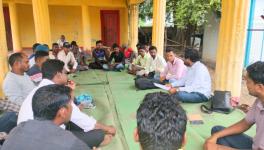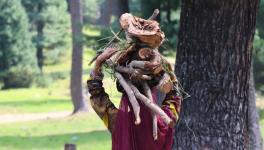UP: Van Gujjars Seek Protection Under FRA as Govt Serves Vacation Notices
Shamshad and Umar Ali addressing the crowd of Van Gujjars
Alam Gir, a Van Gujjar pastoralist, visited a meeting organised by the Van Gujjar Tribal Yuva Sangathan (VGTYS) near Badshahi Bagh, Saharanpur. He lives 14 kms away from the venue in Shah Kumbh khol (a Van Gujjar settlement). "We have been served notices by the forest department that we have to vacate our deras (small houses made of wood and mud) soon," Alam said.
He says that the army has been using the forests for the past two years for firing practice. The meeting was concerned with a recent state government ordinance that permitted the army to use a total of 25,000 hectares out of the total 28,000 hectares of land in the Shivalik range of Uttar Pradesh for the purposes of the training of the Indian army. "The forest department has added that in the 25,000 hectares allotted, there is no one present, ignoring some 1,800 families of Van Gujjars in the same land," said Aman Gujjar, a member of VGTYS.
While the Shivalik forest range has been in working with the Indian army since the 1980s, there have been repeated attempts by the state to displace the indigenous community from the forests of Uttarakhand and Uttar Pradesh. They have always feared the jangalat, the forest department, which has operated as state machinery which cloaks the agenda of displacement of indigenous communities, plant and animal life as well, with the promise of either development or conservation of forests.
In the present context in which the meeting was held, the forest department and the state government seem to have collaborated to push for an agenda for the sake of the Indian army, paying no heed to the rooted lives of the Van Gujjars who have lived in the Shivalik forest range for more than a century.
"This is happening, and even though we have permits granted by the forest department to use the forest and its resources, they are as old as 1925. We showed the permit to the DM sahaab, but he refused to do anything about it," said Alam. There are 91 families in his kohl, and few have been able to come to the venue of the meeting as they live in the very interior of the forests. “Some have the conveyance to come, others will have to walk through the difficult terrain to arrive here,” Alam adds.
Aman adds that the army has been using the Shivalik range for practice for more than the past ten years, "but the area of operation has been limited to some 2-3,000 hectares. Now they seek to expand it," he said.
In the event, Shamshad Gujjar, an educator-activist working for the Sangathan led the way in explaining the severity of the situation and called for solidarity among the community against such an assault of the state on the Van Gujjar community, a community primarily engaged in the grazing cattle through transhumance (movement from lower hills to higher mountainous regions) and selling milk of the cattle. If displaced, the community loses not only their homes but also their livelihood, as cattle grazing is heavily dependent on forests.
"In Shivalik, where we have assembled today, we need to make a concrete strategy and fight for our rights. In Uttarakhand, our community has been fighting with such a strategy, and we need to do the same in the Shivalik range," Shamshad said, addressing the crowd, "We have seen that we live in our khols. Thus, all people from these khols need to get united and form a committee under the Forest Rights Act, 2006 (FRA).”
The foundation of different Forest Rights Committees (FRCs) would help the Van Gujjars to make a case under the FRA for all the 1,800 families living throughout the forest range against the forest department.
Van Gujjars presenting a letter to MLA Umar Ali noting the injustice done to them through the recent ordinance
MLA Umar Ali Khan, representing the Behat legislative assembly, attended the meeting extending support to the community. "I have been in touch and working with the community since 2011, and I promise to be in solidarity with the struggle of the community. I have written an article for the Van Gujjars, which some of you might have read. It was on the history of Van Gujjars, where I highlighted the role of this community in the independence of India," Umar Ali said, addressing the crowd.
He added that though it is important for the army to practice in the forests, for the issue of security is of utmost importance, it is also crucial that such a step be accompanied by proper rehabilitation of the community.
It is a known fact that Van Gujjars have also been friends of the army, sometimes working closely with them to provide information on infiltrators. "As the Sangathan has worked to bring the concerns and lives of the community to the mainstream, in the states of Uttarakhand and Himachal, it needs to be done here in our state of Uttar Pradesh as well," Umar Ali said.
Shamshad highlighted the many rights over the forests, the key to Van Gujjar livelihood. “The states of Himachal Pradesh and Jammu and Kashmir recognise the community as a Scheduled Tribe, granting state reservations. The state also grants land rights to the community in the forest area and also economically helps with the transhumant migration of the community for their homogeneous economy of cattle grazing and the business of milk,” Shamshad said.
The same kind of rights are hard to come by in the states of Uttar Pradesh and Uttarakhand, and now the present dispensation to evict the people of the community from the Shivalik range is directly in contradiction with the rights of the community as provided in the FRA.
In the presence of MP Haji Fazlur Rahman, Shamshad asserted two points about the community. First, the community has been deprived of all the benefits of state-sanctioned schemes. The mainstream refuses to acknowledge the existence of such a community which dwells in the remote interiors of the forests. Second is that the community is not against the army and its practices.
"We have shown our respect for the army when two years ago, a Gujjar woman was killed by a jawan during firing practice, and our community didn't raise our voice in protest. We have no issues with the fact that the army may be given land for their purposes. But first of all, we demand that our rights to the forests be given importance and protected," Shamshad added.
Haji Fazlur notes that while the nature of the response of the community towards the needs of the army is commendable, “the state government needs to protect the community and their housing, provide them better education, healthcare, employment, where the Van Gujjars are severely lacking.” he said.
The next step for the Sangathan is to create the FRCs and submit their list of demands to the District Magistrate ."We are confident that because of the FRA, our dilemma will be resolved, and the people of our community will be safe. The community, mainly illiterate and cut off from the world, is now ready to talk on the same level with the adhikaaris, much to their surprise,” Shamshad added.
The writers are independent journalists.
Get the latest reports & analysis with people's perspective on Protests, movements & deep analytical videos, discussions of the current affairs in your Telegram app. Subscribe to NewsClick's Telegram channel & get Real-Time updates on stories, as they get published on our website.






















